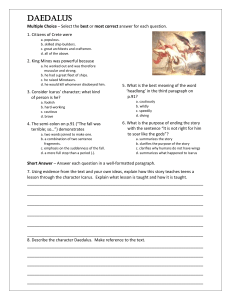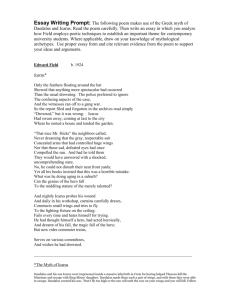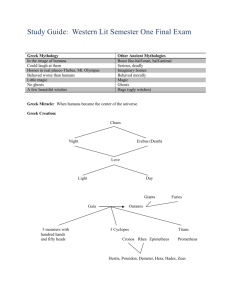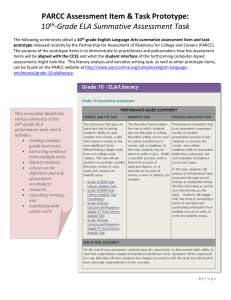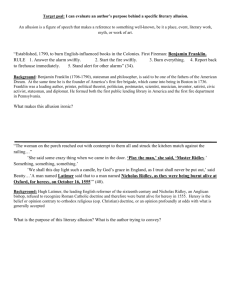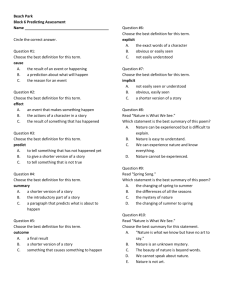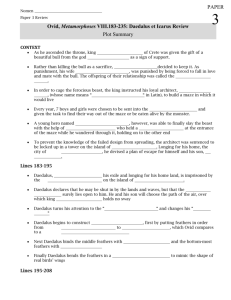Nomen: Dies: Chapter 8 Culture Sheet paterfamilias: “Patria
advertisement
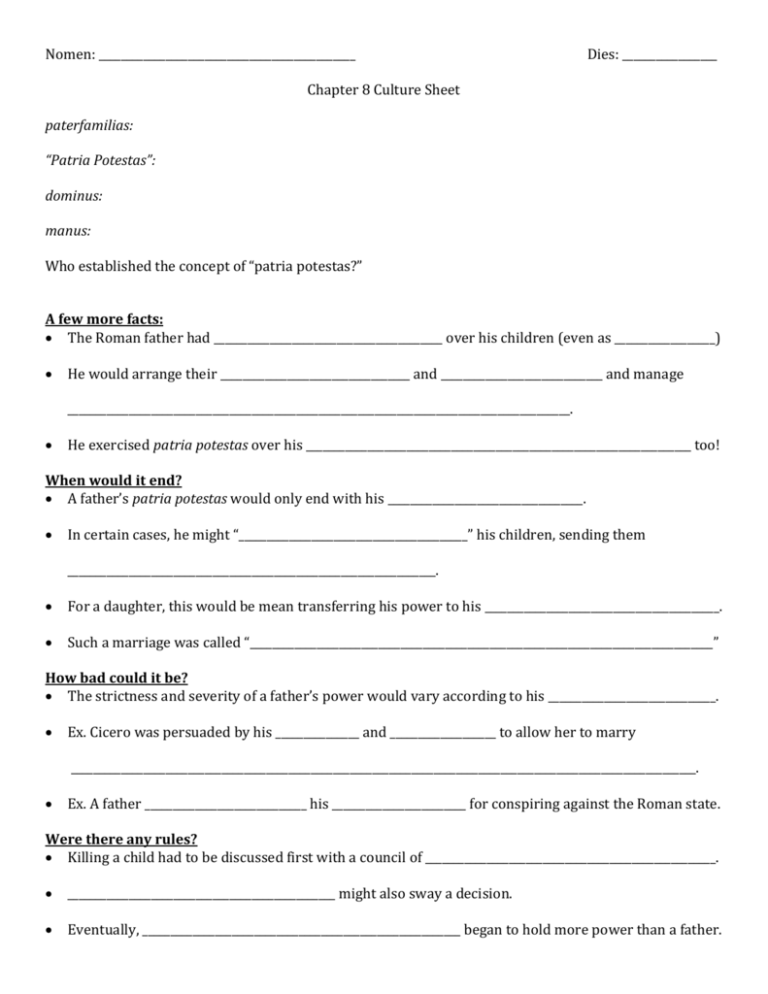
Nomen: ______________________________________________ Dies: _________________ Chapter 8 Culture Sheet paterfamilias: “Patria Potestas”: dominus: manus: Who established the concept of “patria potestas?” A few more facts: The Roman father had _________________________________________ over his children (even as __________________) He would arrange their __________________________________ and _____________________________ and manage __________________________________________________________________________________________. He exercised patria potestas over his _____________________________________________________________________ too! When would it end? A father’s patria potestas would only end with his ___________________________________. In certain cases, he might “_________________________________________” his children, sending them __________________________________________________________________. For a daughter, this would be mean transferring his power to his __________________________________________. Such a marriage was called “___________________________________________________________________________________” How bad could it be? The strictness and severity of a father’s power would vary according to his ______________________________. Ex. Cicero was persuaded by his _______________ and ___________________ to allow her to marry ________________________________________________________________________________________________________________. Ex. A father _____________________________ his ________________________ for conspiring against the Roman state. Were there any rules? Killing a child had to be discussed first with a council of ____________________________________________________. ________________________________________________ might also sway a decision. Eventually, _________________________________________________________ began to hold more power than a father. Did Roman fathers love their families? ___________________________, but the main purpose of a Roman father/mother was to ________________________ ________________________________________________________ by acting as ______________________________________________. Cicero called parental love “amor ille penitus insitus,” which means: _________________________________________________________________________________________________________________________ The Story of Lucius Junius Brutus Lucius Junius Brutus was, according to tradition, the founder of the Roman Republic and its first consul. He was the one who led the rebellion against the Etruscan kings of Rome after the rape of Lucretia. Soon after, he was forced to order the execution of his sons, who were caught conspiring to restore the Etruscans as kings of Rome. The Roman historian Livy gives us the account: Sentence was pronounced and punishment inflicted upon the traitors—a punishment the more conspicuous because the office of consul imposed upon a father the duty of exacting the penalty from his sons. Bound to the stake stood youths of the highest birth; the consul’s sons drew all eyes upon themselves. Men pitied them for their punishment not more than for the crime by which they had deserved that punishment. To think that those young men, in that year of all others, when their country was liberated and her liberator their own father, and when the consulship had begun with the Junian family, could have brought themselves to betray all—the senate, the plebs (common people), and all the gods and men of Rome—to one who had formerly been a tyrannical king and was then an enemy exile!... The culprits were stripped, scourged with rods, and beheaded, while through it all men gazed at the expression on the father’s face, where they might clearly read a father’s anguish, as he administered the nation’s retribution. Livy, II.V.5-8 The Story of Icarus According to Greek mythology, Icarus was the son of a master craftsman, named Daedalus. One day, Daedalus became jealous of his apprentice and threw him off of the Acropolis to his death. As punishment for his crime, Daedalus was exiled to the island of Crete (south of Greece), where he was put in the service of King Minos. There, Daedalus created all sorts of inventions for the king including the famous Labyrinth, which held the beastly Minotaur—a half-half man, half-bull monster that would eat any prisoners thrown into the Labyrinth. It was Daedalus who would give the secret of the Labyrinth to Theseus, the mythological Athenian who slew the Minotaur. It was during this time that Daedalus also had a son, Icarus. Imprisoned in the Labyrinth with Icarus for helping Theseus defeat the Minotaur, Daedalus decided he would have to use his craftsmanship to create a means of escape. To accomplish this, he built two sets of mechanical wings, made of feathers and wax. When the wings were finally ready, Daedalus warned Icarus not to fly too low, out of fear that the feathers would get wet and no longer work, nor too high, as the heat of the sun might melt the wax holding the wings together. He instructed Icarus to follow his path exactly. Young Icarus, overwhelmed by the thrill of flying, went against his father’s wishes and flew higher and higher towards the sun. Soon, Icarus felt the wax melting on his wings and found himself flapping just his bare arms. He fell to his death in the sea, which would be renamed the Icarian Sea.
